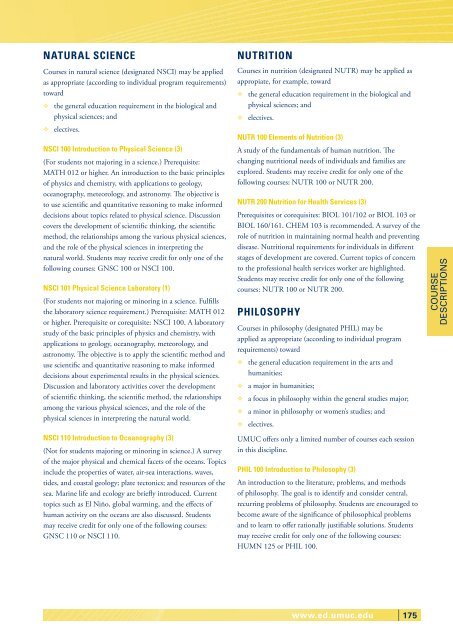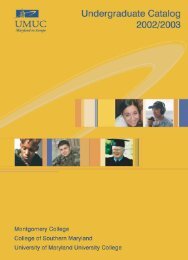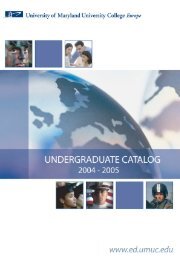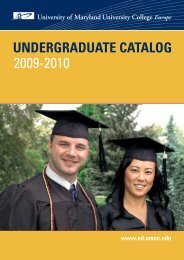Undergraduate Catalog - UMUC Europe
Undergraduate Catalog - UMUC Europe
Undergraduate Catalog - UMUC Europe
You also want an ePaper? Increase the reach of your titles
YUMPU automatically turns print PDFs into web optimized ePapers that Google loves.
NATURAL SCIENCE<br />
Courses in natural science (designated NSCI) may be applied<br />
as appropriate (according to individual program requirements)<br />
toward<br />
G the general education requirement in the biological and<br />
physical sciences; and<br />
G electives.<br />
NSCI 100 Introduction to Physical Science (3)<br />
(For students not majoring in a science.) Prerequisite:<br />
MATH 012 or higher. An introduction to the basic principles<br />
of physics and chemistry, with applications to geology,<br />
oceanography, meteorology, and astronomy. The objective is<br />
to use scientific and quantitative reasoning to make informed<br />
decisions about topics related to physical science. Discussion<br />
covers the development of scientific thinking, the scientific<br />
method, the relationships among the various physical sciences,<br />
and the role of the physical sciences in interpreting the<br />
natural world. Students may receive credit for only one of the<br />
following courses: GNSC 100 or NSCI 100.<br />
NSCI 101 Physical Science Laboratory (1)<br />
(For students not majoring or minoring in a science. Fulfills<br />
the laboratory science requirement.) Prerequisite: MATH 012<br />
or higher. Prerequisite or corequisite: NSCI 100. A laboratory<br />
study of the basic principles of physics and chemistry, with<br />
applications to geology, oceanography, meteorology, and<br />
astronomy. The objective is to apply the scientific method and<br />
use scientific and quantitative reasoning to make informed<br />
decisions about experimental results in the physical sciences.<br />
Discussion and laboratory activities cover the development<br />
of scientific thinking, the scientific method, the relationships<br />
among the various physical sciences, and the role of the<br />
physical sciences in interpreting the natural world.<br />
NSCI 110 Introduction to Oceanography (3)<br />
(Not for students majoring or minoring in science.) A survey<br />
of the major physical and chemical facets of the oceans. Topics<br />
include the properties of water, air-sea interactions, waves,<br />
tides, and coastal geology; plate tectonics; and resources of the<br />
sea. Marine life and ecology are briefly introduced. Current<br />
topics such as El Niño, global warming, and the effects of<br />
human activity on the oceans are also discussed. Students<br />
may receive credit for only one of the following courses:<br />
GNSC 110 or NSCI 110.<br />
NUTRITION<br />
Courses in nutrition (designated NUTR) may be applied as<br />
appropiate, for example, toward<br />
G the general education requirement in the biological and<br />
physical sciences; and<br />
G electives.<br />
NUTR 100 Elements of Nutrition (3)<br />
A study of the fundamentals of human nutrition. The<br />
changing nutritional needs of individuals and families are<br />
explored. Students may receive credit for only one of the<br />
following courses: NUTR 100 or NUTR 200.<br />
NUTR 200 Nutrition for Health Services (3)<br />
Prerequisites or corequisites: BIOL 101/102 or BIOL 103 or<br />
BIOL 160/161. CHEM 103 is recommended. A survey of the<br />
role of nutrition in maintaining normal health and preventing<br />
disease. Nutritional requirements for individuals in different<br />
stages of development are covered. Current topics of concern<br />
to the professional health services worker are highlighted.<br />
Students may receive credit for only one of the following<br />
courses: NUTR 100 or NUTR 200.<br />
PHILOSOPHY<br />
Courses in philosophy (designated PHIL) may be<br />
applied as appropriate (according to individual program<br />
requirements) toward<br />
G the general education requirement in the arts and<br />
humanities;<br />
G a major in humanities;<br />
G a focus in philosophy within the general studies major;<br />
G a minor in philosophy or women’s studies; and<br />
G electives.<br />
<strong>UMUC</strong> offers only a limited number of courses each session<br />
in this discipline.<br />
PHIL 100 Introduction to Philosophy (3)<br />
An introduction to the literature, problems, and methods<br />
of philosophy. The goal is to identify and consider central,<br />
recurring problems of philosophy. Students are encouraged to<br />
become aware of the significance of philosophical problems<br />
and to learn to offer rationally justifiable solutions. Students<br />
may receive credit for only one of the following courses:<br />
HUMN 125 or PHIL 100.<br />
www.ed.umuc.edu 175<br />
COURSE<br />
DESCRIPTIONS






